Thousands of Israelis joined protests across the country on Saturday night, demanding that Israel reach a comprehensive deal with the Hamas terror group to end the war in Gaza and secure the release of all remaining hostages, on the eve of a strike organized by the families of the captives in the hope of pushing the country into action.
The mass demonstrations were organized in the shadow of the defense establishment’s preparations to capture Gaza City, in the Strip’s north, as part of a plan that many relatives of the hostages and security officials have warned will further endanger the remaining living hostages.
Israel is forging ahead with the plans for an expanded military campaign in the Gaza Strip, even as reports have emerged in recent days that Hamas is expressing a newfound willingness to release some of the remaining 50 hostages in exchange for a temporary ceasefire. But Prime Minister Benjamin Netanyahu, who for many months had been pursuing the partial-deal framework, reiterated on Saturday night that Israel will only agree to a comprehensive deal if it meets Israel’s conditions for ending the war, which include demilitarizing the Gaza Strip and removing Hamas from power.
Yet officials familiar with the situation have warned that Israel’s demands mean that it will be difficult to broker a comprehensive deal in a short time period.
In addition to the main demonstrations in Tel Aviv, protests were held in Jerusalem, Haifa, Rehovot, and other major cities, and smaller ones were organized at junctions across the country.
At the weekly anti-government protest outside the Kirya military headquarters in Tel Aviv on Saturday night, Einav Zangauker, mother of hostage Matan Zangauker, declared that the families of the hostages were done waiting for Netanyahu to “stop the war when it’s convenient for him.”
“Tomorrow we’ll stop the country,” vowed Zangauker, one of the key organizers of the planned nationwide strike. “We’ll stop the country tomorrow for our lives here, for our children, for the state of Israel,” she said. “We can’t take any more.”
“Tomorrow is only the beginning,” she promised. “We’ve stopped waiting for Netanyahu to stop the war when it’s convenient for him politically. We demand quiet, security, a future, and the end of the war.”
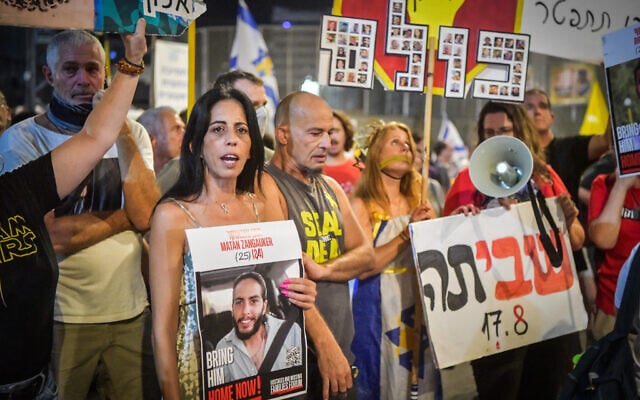
Demonstrators protest against the Israeli government and for the release of Israelis held hostage in the Gaza Strip outside the Kirya military base in Tel Aviv, August 16, 2025. (Avshalom Sassoni/Flash90)
Directly addressing the government’s actions and its plans to conquer Gaza City, Zangauker warned that “if we do not stop the decision to occupy the Strip, we will wake up to ‘permitted for publication’ notices about 20 hostages.”
News relating to the death of soldiers or hostages is usually published by Hebrew news outlets with the phrase “permitted for publication” at the top of the item.
Sunday’s strike has not been endorsed by the country’s powerful Histadrut labor union, but has nevertheless been backed by local municipalities, businesses across the country, universities, and various unions, including the Israel Airports Authority employees’ union.
Zangauker’s call was picked up by the relatives of other hostages, including Itzik Horn, who was speaking at the rally in Tel Aviv’s Hostages Square, which serves as an apolitical alternative to the more vocally anti-government protests held nearby.
Horn’s son Eitan is held captive in Gaza, and another of his sons, Iair, was released by the terror group in February.
“Tomorrow, Israel will come to a halt, and I call on everyone to participate,” he urged. “This is not a vacation day to pass time in the malls; it is a day to cry out.”
“It is not just a day to empathize with the hostage families, but a civil demonstration to protect the State of Israel’s moral character,” said Horn.
He accused the government of neglecting the hostages, questioning how the cabinet could agree to expand the fighting in Gaza after “seeing the videos of starvation and the difficult testimonies of the hostages who were returned home, [describing] the immense suffering, the torture, the psychological terror.”
If Israel’s political leadership indeed decides to pursue its plan to take over Gaza City, Horn said, then, “why don’t they have the courage to go out publicly and announce their choice of my son Eitan’s death?”
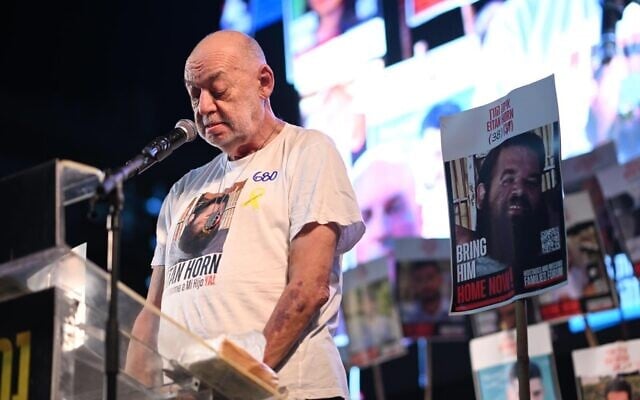
Itzik Horn, the father of Hamas hostage Eitan Horn, speaks to a hostage protest in Tel Aviv’s Hostages Square on August 16, 2025. (Hostages and Missing Families Forum)
“As we demonstrate, they accuse us of hurting our loved ones and playing into the hands of Hamas,” he continued. “[But] how does the conflict between the defense minister and the chief of staff help bring Eitan and the rest of the hostages back?”
“Why are they still in Gaza?” he demanded of the crowd, before answering his own question: “They are there because the leadership doesn’t want to return them home; the time has come to bring them back.”
‘Caught in a war he has no side in’
Pushpa Joshi, the sister of abducted Nepali agriculture student Bipin Joshi, also addressed the crowd at Hostages Square for the first time, having arrived in Israel last week.
There have been no signs of life from Joshi since he was abducted from Kibbutz Alumim on October 7, 2023, and Israel has said his status is unknown.
“My brother is a student who was caught in a war he has no side in. It took us 22 months to find the strength to come here,” said the captive’s 17-year-old sister, who arrived in Israel with her mother, Padma, last week after long months of campaigning and raising awareness in Nepal.
WATCH: Pushpa Joshi, sister of Nepali hostage Bipin, spoke for the first time in front of thousands at Hostage Square.
“Almost two years without a sign of life. Is he starving? Injured? Alive?”
You’re so brave, Pushpa. We won’t give up. We’ll keep fighting until Bipin is home. pic.twitter.com/i5CGaqBG2E
— Hen Mazzig (@HenMazzig) August 16, 2025
“We were isolated in Nepal, separated by language, culture, and fear. We focused on prayers for him, but prayers are not enough,” she said.
A number of protesters in the crowd were waving Nepali flags in solidarity with the two women.
Joshi hinted that the recent videos published by Palestinian Islamic Jihad and Hamas of hostages Rom Braslavski and Evyatar David, in which the two appeared emaciated and in dire health, acted as an impetus for their visit.
She added that the footage “crushed us. My mom and dad are devastated, barely holding on.”
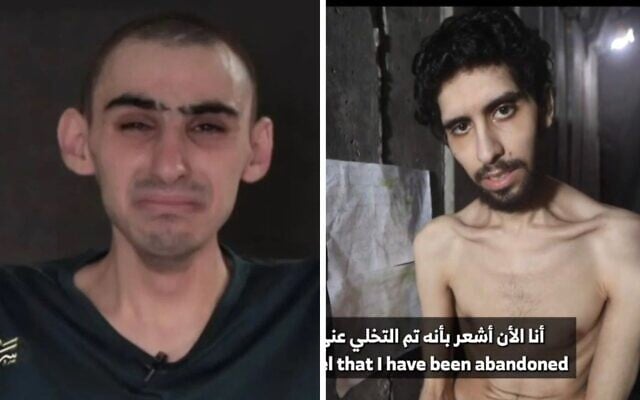
Still images of hostages Ram Braslavski (left) and Evyatar David from Hamas propaganda videos, cleared for publication by their families in August 2025. (Composite screenshot)
“Almost two years without a sign of life. Is he starving? Wounded? Alive?” she asked, struggling to speak through tears.
In their native Nepali, Joshi addressed her brother: “I miss you so much, brother. Don’t lose hope, be strong, stay alive.”
Maayan Sherman, whose son Ron was killed in captivity in November 2023, declared from the stage at Hostages Square: “Netanyahu and his defense minister [Yoav Gallant] knowingly chose to kill my son.”
On December 14, 2023, IDF troops recovered Ron’s body from a tunnel in northern Gaza along with those of Nik Beizer and Elia Toledano.
An IDF investigation published in September 2024 revealed that the three were killed on November 10, 2023, as a result of a “byproduct” of an Israeli airstrike in the Gaza Strip, likely indicating that they suffocated or were killed by carbon monoxide poisoning inside a tunnel. Ron’s family said he had asthma and needed an inhaler.
“I’m here as a bereaved mother and aunt, to save other mothers from the same fate,” said Sherman, explaining that her son had been used as a senior Hamas official’s human shield.
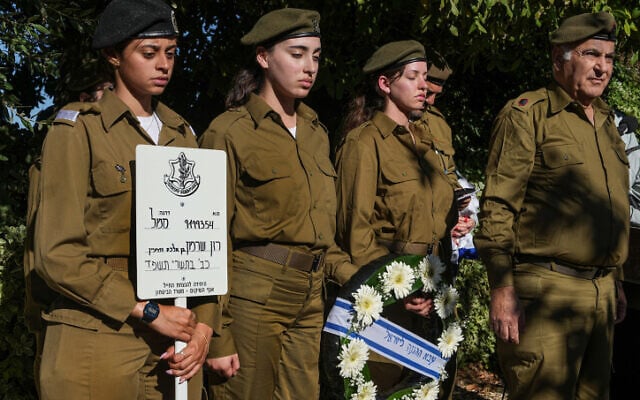
Family and friends mourn at the funeral of IDF soldier Ron Sherman who was abducted by Hamas terrorists on October 7 and whose body was recovered during a military operation in the Gaza Strip, at the cemetery in Lehavim, December 15, 2023. (Flash90)
The government “chose to give up on our sons,” she said, castigating the government’s Gaza City plan.
“The guerrilla war in Gaza will cost much blood of our soldiers,” she continued, condemning the government as one “that sends the sons of others to death and is working just for personal and political motives.”
“The goals of destruction of Hamas and saving the hostages are contradictory,” she said. “Whoever chooses one gives up on the other.”
There must be an “immediate ceasefire and deal now,” she declared, or else the nation will “lose the future of our beloved state of Israel.”
‘Total moral destruction’
Dana Silberman Sitton, sister and aunt of the murdered hostages Shiri, Ariel, and Kfir Bibas, implored the protesters to fight “apathy” as the war in Gaza drags on without an end in sight.
Warning that the government is “destroying Israeli society in the name of political survival,” Silberman Sitton vowed that “we’ll keep fighting the external enemy but also the internal apathy, and demand the most basic thing: justice, truth, and human life.”
“If the country doesn’t wake up now, it will wake up to a total moral destruction,” she cautioned.
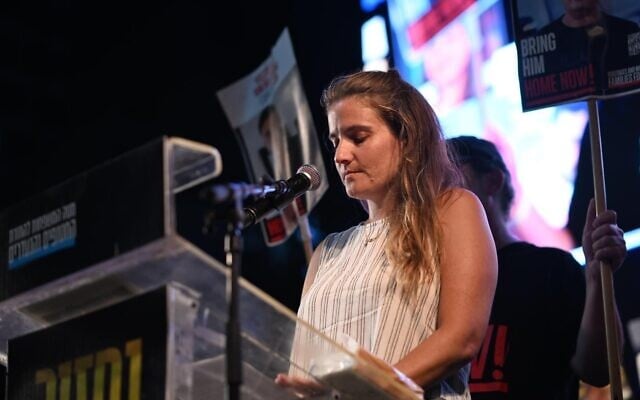
Dana Silberman Sitton, sister of Shiri Bibas, speaks to a rally at Hostages Square in Tel Aviv on August 16, 2025. (Lior Rotstein/Hostages and Missing Families Forum)
The Bibas family, parents Yarden and Shiri, and young sons Ariel and Kfir, were taken hostage in the Hamas-led October 7, 2023, massacre and became perhaps the most prominent faces of the hostages’ plight.
Yarden was released during a ceasefire earlier this year, and the bodies of his wife and children, who were murdered in captivity, were returned several weeks later.
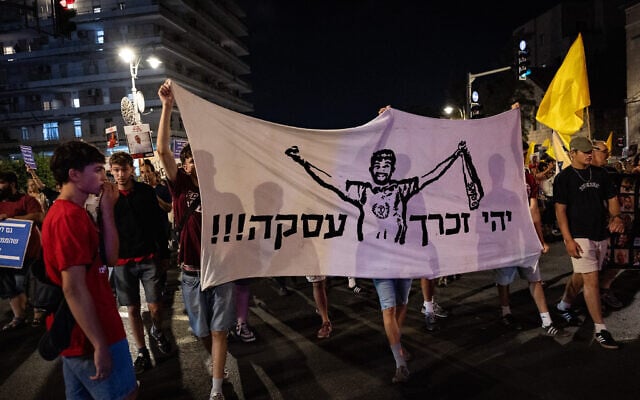
Protesters lift a banner depicting slain American-Israeli hostage Hersh Goldberg-Polin that reads “May your memory be a deal,” near the Prime Minister’s Residence in Jerusalem, on August 16, 2025. (Yonatan Sindel/Flash90)
PM’s office again rules out partial deal
Even as protesters demanded that Israel take immediate action to recover the remaining 50 hostages and save those who are still alive, the Prime Minister’s Office issued a statement on Saturday evening, declaring that Israel will only agree to a comprehensive deal “in accordance with our conditions for ending the war.”
These conditions, the PMO said, “include the disarming of Hamas, the demilitarization of the Gaza Strip, Israeli control of the Gaza perimeter, and the installation of non-Hamas and non-Palestinian Authority governance that will live in peace with Israel.”
The statement came in response to multiple reports in recent days of ostensible Hamas flexibility and its possible willingness to return to the so-called “Witkoff proposal “ or a 60-day ceasefire-hostage deal, in which half the living hostages would be released, with provisions for negotiations on a permanent end to the war.
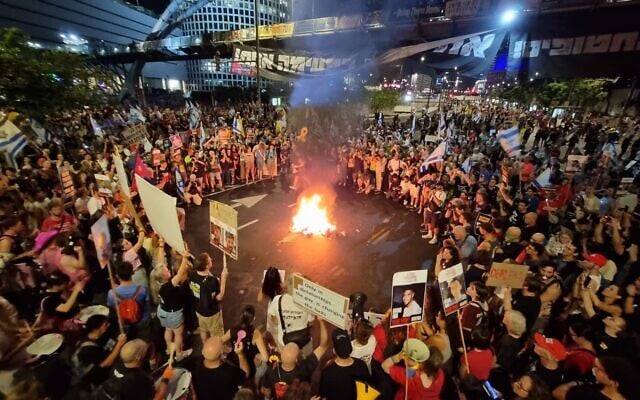
Protesters light a bonfire on Tel Aviv’s Begin Road as they call for the release of Hamas-held hostages in Gaza, August 16, 2025. (Aviv Hassidov / Pro-Democracy Protest Movement)
Terror groups in the Gaza Strip are still holding 50 hostages, including 49 of the 251 abducted by Hamas-led terrorists on October 7, 2023. They include the bodies of at least 28 confirmed dead by the IDF. Twenty are believed to be alive and there are grave concerns for the lives of two others, Israeli officials have said. Hamas is also holding the body of an IDF soldier killed in Gaza in 2014.
Hamas released 30 hostages — 20 Israeli civilians, five soldiers, and five Thai nationals — and the bodies of eight slain Israeli captives during a ceasefire between January and March, and one additional hostage, a dual American-Israeli citizen, in May as a “gesture” to the United States. The terror group freed 105 civilians during a weeklong truce in late November 2023, and four hostages were released before that in the early weeks of the war.
In exchange, Israel has freed some 2,000 jailed Palestinian terrorists, security prisoners, and Gazan terror suspects detained during the war.
Eight hostages have been rescued from captivity by troops alive, and the bodies of 49 have also been recovered, including three mistakenly killed by the Israeli military as they tried to escape their captors, and the body of a soldier who was killed in 2014.





